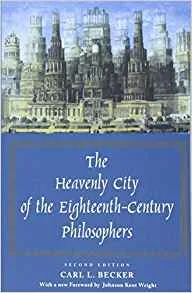Whenever a certain RV friend visits the area, I feel inspired to simplify my rig. In the past, that urge has had pretty important consequences. So I tried to get in the mood again, this year.
It had been awhile since I had made use of the 20 dead-tree books that I carry in my tow vehicle. So it seemed like a good idea to reread them, and try harder to replace them with the eBook version.
The first book was "The Heavenly City of the Eighteenth Century Philosophers," by Carl Becker. It is tempting to try to explain why I have always loved this book, but maybe analyzing the book will kill its beauty!
Aw hell, I'll do it anyway: the book is about a fundamental topic; it is short; although written by a professor, it is enjoyable to read; it doesn't let the trees get in the way of the forest; and it is full of imaginative warmth.
Therefore it is a good book to practice the consummate skill of trying to 'rip the book's heart out', that is, extracting the book's inner essence in the fewest amount of words.
Here is my result: "Man in general, like the economic man, was a being that did not exist in the world of time and place, but in the conceptual world..."
Granted, it isn't one of those quotes that sings to one's ears, but the idea is crucial today, when leftist intellectuals keep seducing society with their latest-and-greatest theory for reforming society.
They, too, see human beings as incorporeal, impersonal, and mathematical data points that must lie on the curves predicted by their brilliant social and political theories.
It had been awhile since I had made use of the 20 dead-tree books that I carry in my tow vehicle. So it seemed like a good idea to reread them, and try harder to replace them with the eBook version.
The first book was "The Heavenly City of the Eighteenth Century Philosophers," by Carl Becker. It is tempting to try to explain why I have always loved this book, but maybe analyzing the book will kill its beauty!
Aw hell, I'll do it anyway: the book is about a fundamental topic; it is short; although written by a professor, it is enjoyable to read; it doesn't let the trees get in the way of the forest; and it is full of imaginative warmth.
Therefore it is a good book to practice the consummate skill of trying to 'rip the book's heart out', that is, extracting the book's inner essence in the fewest amount of words.
Here is my result: "Man in general, like the economic man, was a being that did not exist in the world of time and place, but in the conceptual world..."
Granted, it isn't one of those quotes that sings to one's ears, but the idea is crucial today, when leftist intellectuals keep seducing society with their latest-and-greatest theory for reforming society.
They, too, see human beings as incorporeal, impersonal, and mathematical data points that must lie on the curves predicted by their brilliant social and political theories.

Comments
I will be careful to do this clicking on my laptop from now on!
I commented on this paragraph: "Here is my result: Man in general, like the economic man, was a being that did not exist in the world of time and place, but in the conceptual world..."
I said that the idea of "man" is always a concept and it is also inherently tied to time and place as well. I mentioned that our idea of "man" greatly changed after Darwin. Previous to that, Christianity told us for centuries that we were above the animals. In fact they didn't look upon us as animals at all since we had "souls" and an afterlife. Darwin fixed all that and we haven't been the same since.
I think this is one more way that dogs have it over us, hands down. We think in concepts, i.e., language and it is limiting. Dogs are not burdened by these limitations. They maneuver their world, deciding good and bad, by their senses and not by concepts which by their very nature have been formed by others. How many of your concepts are truly your own?
Thanks for the book recommendation. I am reading it now. Did you find a free download?
George
http://gen.lib.rus.ec/search.php?req=the+heavenly+city+of+the+eighteenth+century+philosophers&lg_topic=libgen&open=0&view=simple&res=25&phrase=1&column=def
Click on the blue line with the title in it to download.